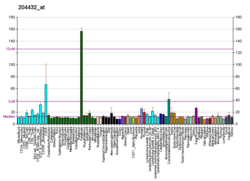SOX12
SOX12 is a protein that in humans is encoded by the SOX12 gene.[5][6] Sox12 belongs to the SoxC group of Sox family of transcription factors, together with Sox4 and Sox11. Sox12-null knockout mice appear normal, unlike Sox4 or Sox11 knockout mice. This probably comes from functional redundancy with Sox4 and Sox11.[7] Sox12 is a weaker activator than both Sox4 and Sox11 in mouse.[8]
Members of the SOX family of transcription factors are characterized by the presence of a DNA-binding high mobility group (HMG) domain, homologous to the HMG box of sex-determining region Y (SRY). Forming a subgroup of the HMG domain superfamily, SOX proteins have been implicated in cell fate decisions in a diverse range of developmental processes. SOX transcription factors have diverse tissue-specific expression patterns during early development and have been proposed to act as target-specific transcription factors and/or as chromatin structure regulatory elements. The protein encoded by this gene was identified as a SOX family member based on conserved domains and its expression in various tissues suggests a role in both differentiation and maintenance of several cell types.[6]
References
- ^ a b c GRCh38: Ensembl release 89: ENSG00000177732 – Ensembl, May 2017
- ^ a b c GRCm38: Ensembl release 89: ENSMUSG00000051817 – Ensembl, May 2017
- ^ "Human PubMed Reference:". National Center for Biotechnology Information, U.S. National Library of Medicine.
- ^ "Mouse PubMed Reference:". National Center for Biotechnology Information, U.S. National Library of Medicine.
- ^ Jay P, Sahly I, Goze C, Taviaux S, Poulat F, Couly G, Abitbol M, Berta P (Aug 1997). "SOX22 is a new member of the SOX gene family, mainly expressed in human nervous tissue". Hum Mol Genet. 6 (7): 1069–77. doi:10.1093/hmg/6.7.1069. PMID 9215677.
- ^ a b "Entrez Gene: SOX12 SRY (sex determining region Y)-box 12".
- ^ Hoser M, Potzner MR, Koch JM, Bösl MR, Wegner M, Sock E (August 2008). "Sox12 Deletion in the Mouse Reveals Nonreciprocal Redundancy with the Related Sox4 and Sox11 Transcription Factors". Mol. Cell. Biol. 28 (15): 4675–87. doi:10.1128/MCB.00338-08. PMC 2493363. PMID 18505825.
- ^ Dy P, Penzo-Méndez A, Wang H, Pedraza CE, Macklin WB, Lefebvre V (May 2008). "The three SoxC proteins—Sox4, Sox11 and Sox12—exhibit overlapping expression patterns and molecular properties". Nucleic Acids Res. 36 (9): 3101–17. doi:10.1093/nar/gkn162. PMC 2396431. PMID 18403418.
Further reading
- Bowles J, Schepers G, Koopman P (2001). "Phylogeny of the SOX family of developmental transcription factors based on sequence and structural indicators". Dev. Biol. 227 (2): 239–55. doi:10.1006/dbio.2000.9883. PMID 11071752.
- Weiss MA (2001). "Floppy SOX: mutual induced fit in hmg (high-mobility group) box-DNA recognition". Mol. Endocrinol. 15 (3): 353–62. doi:10.1210/mend.15.3.0617. PMID 11222737.
- Gozé C, Poulat F, Berta P (1993). "Partial cloning of SOX-11 and SOX-12, two new human SOX genes". Nucleic Acids Res. 21 (12): 2943. doi:10.1093/nar/21.12.2943. PMC 309692. PMID 8332506.




